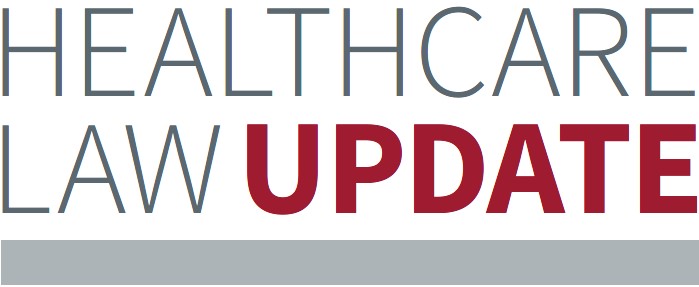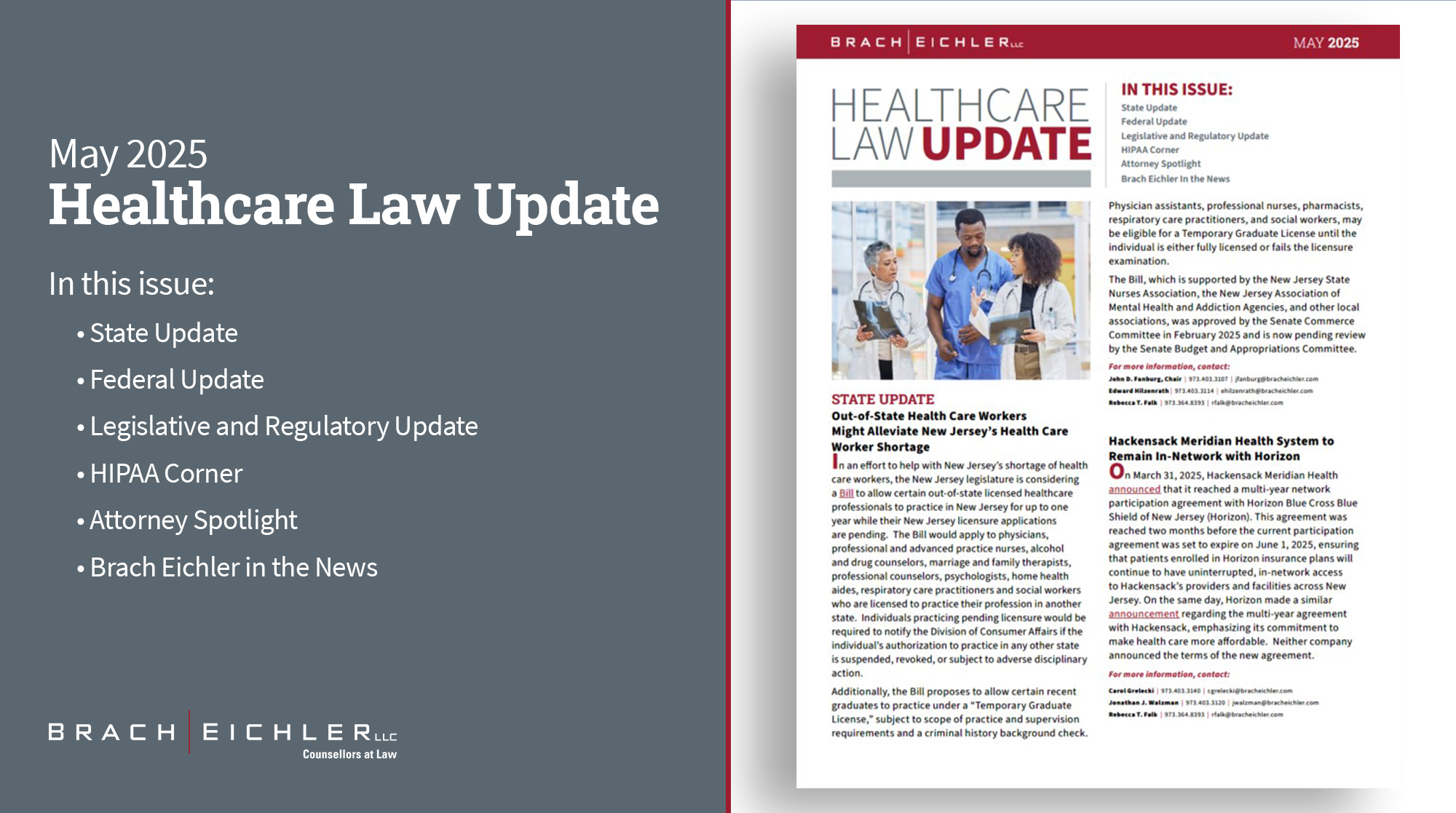


In an effort to help with New Jersey’s shortage of health care workers, the New Jersey legislature is considering a Bill to allow certain out-of-state licensed healthcare professionals to practice in New Jersey for up to one year while their New Jersey licensure applications are pending. The Bill would apply to physicians, professional and advanced practice nurses, alcohol and drug counselors, marriage and family therapists, professional counselors, psychologists, home health aides, respiratory care practitioners and social workers who are licensed to practice their profession in another state. Individuals practicing pending licensure would be required to notify the Division of Consumer Affairs if the individual’s authorization to practice in any other state is suspended, revoked, or subject to adverse disciplinary action.
Additionally, the Bill proposes to allow certain recent graduates to practice under a “Temporary Graduate License,” subject to scope of practice and supervision requirements and a criminal history background check.
Physician assistants, professional nurses, pharmacists, respiratory care practitioners, and social workers, may be eligible for a Temporary Graduate License until the individual is either fully licensed or fails the licensure examination.
The Bill, which is supported by the New Jersey State Nurses Association, the New Jersey Association of Mental Health and Addiction Agencies, and other local associations, was approved by the Senate Commerce Committee in February 2025 and is now pending review by the Senate Budget and Appropriations Committee.
For more information, contact:
John D. Fanburg, Chair | 973.403.3107 | jfanburg@bracheichler.com
Edward Hilzenrath | 973.403.3114 | ehilzenrath@bracheichler.com
Rebecca T. Falk | 973.364.8393 | rfalk@bracheichler.com
On March 31, 2025, Hackensack Meridian Health announced that it reached a multi-year network participation agreement with Horizon Blue Cross Blue Shield of New Jersey (Horizon). This agreement was reached two months before the current participation agreement was set to expire on June 1, 2025, ensuring that patients enrolled in Horizon insurance plans will continue to have uninterrupted, in-network access to Hackensack’s providers and facilities across New Jersey. On the same day, Horizon made a similar announcement regarding the multi-year agreement with Hackensack, emphasizing its commitment to make health care more affordable. Neither company announced the terms of the new agreement.
For more information, contact:
Carol Grelecki | 973.403.3140 | cgrelecki@bracheichler.com
Jonathan J. Walzman | 973.403.3120 | jwalzman@bracheichler.com
Rebecca T. Falk | 973.364.8393 | rfalk@bracheichler.com
The Trump administration recently declined to finalize portions of a rule proposed by the Biden administration in November 2024 for Medicare coverage of obesity drugs, such as GLP-1 medications Wegovy and Zepbound. Medicare does cover weight-loss drugs for conditions like diabetes and cardiovascular disease. Additionally, some states cover weight loss drugs in their Medicaid programs. An October 2024 report by the Congressional Budget Office, warned that authorizing these anti-obesity treatments for Medicare coverage would increase federal spending by approximately $35 billion from 2026 to 2034, while the total savings from improved health would be small, totaling under $50 million in 2026 and around $1 billion in 2034.
For more information, contact:
Joseph M. Gorrell | 973.403.3112 | jgorrell@bracheichler.com
Jonathan J. Walzman | 973.403.3120 | jwalzman@bracheichler.com
Paul DeMartino, Jr. | 973.364.5228 | pdemartino@ bracheichler.com
An alliance of 23 states and the District of Columbia recently filed a lawsuit against the Trump administration over $11 billion in cuts to public health grants. The Department of Health and Human Services (HHS) announced in March that it would stop providing the funds, which were allocated by Congress during the COVID-19 pandemic. The Trump administration’s position is that the cuts were justified because “the COVID-19 pandemic is over.” The lawsuit asks the Court to order the administration to reinstate the funding. On April 3, 2025, a Federal judge issued a temporary restraining order blocking HHS from enacting the funding cuts during the pendency of the lawsuit.
In the lawsuit, the plaintiffs claim that the funding is used for a variety of urgent public health needs such as tracking infectious diseases, providing access to vaccinations, improving emergency preparedness, providing mental health and substance abuse services, and modernizing public health infrastructure. The plaintiffs also assert that cutting the funding will reverse years of progress on the opioid crisis and mental health,
and stress hospital systems to care for additional struggling patients. According to the lawsuit, the funding cuts are illegal because Congress did not limit the funding for use for the COVID-19 pandemic only, and the federal government did not provide a rational basis for rescinding the funding. According to the plaintiffs, these funding cuts will result in serious harm to public health and put states at greater risk for future pandemics and the spread of otherwise preventable disease.
For more information, contact:
Lani M. Dornfeld, CHPC | 973.403.3136 | ldornfeld@bracheichler.com
Richard B. Robins | 973.447.9663 | rrobins@bracheichler.com
Paul DeMartino, Jr. | 973.364.5228 | pdemartino@ bracheichler.com
On March 7, 2025, the U.S. Department of Health and Human Services, Office for Civil Rights announced investigations of four unnamed medical schools and hospitals for race or sex-based discrimination. The investigations aim to determine whether any of these institutions, which receive federal funding, have implemented race or sex-based criteria in ways that may violate federal anti-discrimination laws. The investigations are being conducted under Title VI of the Civil Rights Act of 1964 and Section 1557 of the Affordable Care Act, and are part of a broader federal initiative tied to Executive Order 14173, which directs agencies to reinforce merit-based practices and address alleged unlawful use of diversity, equity, and inclusion policies.
For more information, contact:
Keith J. Roberts | 973.364.5201 | kroberts@bracheichler.com
Shannon Carroll | 973.403.3126 | scarroll@bracheichler.com
Vanessa Coleman | 973.364.5208 | vcoleman@bracheichler.com
On March 27, 2025, the U.S. Department of Health and Human Services (HHS) announced that it is undergoing a significant organizational transformation in line with the federal government’s broader efficiency and costcutting initiative. The restructuring is pursuant to an executive directive focused on streamlining operations and reducing the size of the federal workforce. As part of this initiative, approximately 10,000 employees across multiple HHS agencies — including the Food and Drug Administration, Centers for Disease Control and
Prevention (CDC), and National Institutes of Health — are being laid off. These reductions, along with prior staffing changes and early retirement programs, will reduce HHS’s overall staff from 82,000 to 62,000.
The restructuring also incorporates several structural and functional changes, including the following:
• Creation of the Administration for a Healthy America: A new division that is a consolidation of multiple agencies and focuses on primary care, maternal and child health, mental health, and environmental health.
• Establishment of a New Assistant Secretary for Enforcement: This role will oversee appeals and civil rights enforcement to enhance accountability and combat fraud.
• Reorganization of Services for Older Adults and People with Disabilities: Critical programs that support older adults and people with disabilities will be integrated into other HHS agencies.
HHS states that essential services like Medicare and Medicaid will be unaffected by the restructuring.
For more information, contact:
Joseph M. Gorrell | 973.403.3112 | jgorrell@bracheichler.com
Edward J. Yun | 973.364.5229 | eyun@bracheichler.com
Vanessa Coleman | 973.364.5208 | vcoleman@bracheichler.com
In March 2025, the U.S. Department of Health and Human Services, Office of Inspector General, (OIG) issued its annual report on case outcomes of Medicaid Fraud Control Units (Units) for fiscal year 2024. Units investigate and prosecute Medicaid provider fraud and patient abuse or neglect. The report includes the following findings:
• Nurse’s aides and nurses were the top two provider types for patient abuse or neglect convictions.
• Pharmaceutical manufacturers accounted for more civil settlement and judgments than any other provider type, followed by durable medical equipment suppliers.
• The amount of annual criminal recoveries increased substantially from $272 million in fiscal year 2023 to $961 million in fiscal year 2024.
• The number of fraud referrals received from managed care organizations, as well the number of managed care organization fraud cases opened by Units, increased.
Ultimately, the Units reported the highest number of
criminal recoveries in the past 10 years but a decline in the number of civil recoveries. For 2024, the Units recovered approximately $1.4 billion in criminal and civil settlements, which is roughly 3.5 times the funds spent on their operations.
For more information, contact:
Riza I. Dagli | 973.403.3103 | rdagli@bracheichler.com
Edward J. Yun | 973.364.5229 | eyun@bracheichler.com
Cynthia J. Liba | 973.403.3106 | cliba@bracheichler.com
Assembly Bill 5419, introduced in the New Jersey Assembly on March 6, 2025, would prohibit health care professionals from providing gender-affirming health care services to persons under 21 years of age. Prohibited gender-affirming health care services would include all supplies, care, and services of a medical, surgical, therapeutic, diagnostic, preventative, rehabilitative, or supportive nature, including medication, relating to the treatment of gender dysphoria and gender incongruence. However, supplies, care, and services of a behavioral health, mental health, or psychiatric nature would be excluded from the scope of the Bill.
Assembly Bill 5488, introduced in the New Jersey Assembly on March 20, 2025, would prohibit hospitals and clinical laboratories from collecting, or requesting to collect, data concerning a minor patient’s sexual orientation or gender identity, unless the patient or the patient’s parent or guardian voluntarily provides the data. If such information is provided voluntarily, hospitals and clinical laboratories would only be able to use the information for purposes of medical diagnosis and treatment.
Assembly Bill 5500, introduced in the New Jersey Assembly on March 24, 2025, would require the Commissioner of Health, in consultation with the Commissioner of Human Services, to establish a training program for nursing home staff in the care of residents who have behavioral health issues. If enacted, the training
program would include sensitivity to behavioral health issues among residents, information about depression and other psychiatric disorders, and the use of medication to treat those disorders. Nursing homes would be required to provide such training annually to certified nurse aides, nurses, and other health care professionals.
Senate Bill 4294, introduced in the New Jersey Senate on March 24, 2025, would require Medicaid to cover ovulation enhancing drugs and the medical services related to administering such drugs for certain beneficiaries who are experiencing infertility. The scope of the Bill would apply to medical services related to prescribing and monitoring the use of such drugs for individuals 21 through 44 years of age if there is federal financial participation available. Medical services covered under the bill would be limited to office visits, hysterosalpingograms, pelvic ultrasounds, and blood testing.
The New Jersey Department of Health recently proposed a new regulation regarding support persons accompanying patients in hospital settings, based on support person accommodations made during the COVID-19 Public Health Emergency. Specifically, the Department is proposing to require hospitals to allow a support person, 18 years of age or older, to accompany a hospital patient throughout the patient’s treatment in all areas where communication between hospital staff and patients would normally take place. If adopted, patients would be able to list one individual as the primary support person, who would function as the main contact for the patient’s providers, other than the patient. Hospitals would be required to ensure listed support persons have 24-hour access to the patient.
The New Jersey Public Option Health Care Act (Senate Bill 4218), introduced in the New Jersey Senate on March 3, 2025, would create the New Jersey Public Option Health Care Program to provide a comprehensive marketplace health insurance plan. The Commissioner of Health, in consultation with the Commissioner of Banking and Insurance, would be required to implement the program, establish premiums for members, and

maintain standards for provider participation. Any health care provider who is qualified to participate under Medicaid, NJ FamilyCare or Medicare would be qualified to participate in this program.
For more information, contact:
John D. Fanburg, Chair | 973.403.3107 | jfanburg@bracheichler.com
Edward Hilzenrath | 973.403.3114 | ehilzenrath@bracheichler.com
Rebecca T. Falk | 973.364.8393 | rfalk@bracheichler.com
The Department of Health & Human Services, Office for Civil Rights (OCR) recently announced the settlement of its 11th ransomware enforcement action and 7th Risk Analysis Initiative. At the core of the OCR’s findings in this settlement and others like it is that the affected covered entities or their business associates did not periodically and timely conduct a thorough risk analysis to determine the potential risks and vulnerabilities to the confidentiality, integrity, and availability of each organization’s electronic protected health information; did not develop and implement a risk management plan to address and mitigate the risks and vulnerabilities identified in the risk analysis; did not develop a written process to regularly review records of information system activity, such as audit logs, access reports, and security incident tracking reports; and did not have in place other required security protections. We anticipate further settlements will result from the OCR’s Risk Analysis Initiative and investigations of ransomware attacks.
If you need assistance with your HIPAA compliance program, an OCR investigation, or a data breach incident, please contact:
Lani M. Dornfeld, CHPC | 973.403.3136 | ldornfeld@bracheichler.com
Get to know the faces and stories of the people behind the articles in each issue. This month, we invite you to
meet Member and HLU Editor Edward Hilzenrath and Associate Rebecca Falk.
In your opinion, what is the most pressing legal issue currently facing the healthcare industry?
In March of this year, the Trump administration announced significant cuts to the Department of Health and Human Services (HHS), including a 10,000-employee layoff. The administration is targeting budget cuts of up to a $40 billion, which would be approximately a third of HHS’s prior budget. These cuts would impact various agencies and programs, including the Centers for Medicare and Medicaid Services, the Food and Drug Administration, the Centers for Disease Control and Prevention, and the National Institutes of Health. Healthcare providers and their advisors will need to navigate these reductions, which may impact the timing of various HHS agency approvals and responses to applications and inquiries.
What personal qualities or skills do you think are most important for a healthcare attorney to cultivate, both professionally and personally?
Healthcare attorneys must be able to interpret complex statutes, regulations and legal nuances and then be able to explain those complex laws and concepts to physicians and other healthcare industry participants in a non-legal manner. Strong analytical skills coupled with an attention to detail and strong communication skills are the keys to being a successful healthcare attorney.
In your opinion, what is the most pressing legal issue currently facing the healthcare industry?
One pressing legal issue currently facing the healthcare industry is the lack of government advice on the use of AI to support clinical decisions. While there is some guidance from the federal government and from the New Jersey Attorney General, the guidance doesn’t directly relate to legal issues that may arise from the use of AI by clinicians, such as liability, or the intersection of AI and patient data privacy and security. With the rapid integration of AI across various healthcare functions, there should be more comprehensive government regulation to address the unique challenges.
What personal qualities or skills do you think are most important for a healthcare attorney to cultivate, both professionally and personally?
A healthcare attorney should have strong analytical skills to navigate complex regulations and transactions. Additionally, industry knowledge, experience, and careful attention to details is important to best represent healthcare clients.

On May 9, Managing Member and Healthcare Law Chair John D. Fanburg, will give a legal, legislative and regulatory update at the New Jersey Obstetrical & Gynecological Society’s 73rd Annual Meeting.
On April 21, Lani Dornfeld, Healthcare Law Member, issued a Healthcare alert entitled “Proposed Amendments to HIPAA Security Rule: What’s Ahead” regarding a proposal to overhaul and strengthen the HIPAA Security Rule and cybersecurity in the healthcare industry.
On April 1, Joseph M. Gorrell, Healthcare Law Member, was honored with inclusion in NJBiz’s “2025 ICON Awards” list for Distinguished Career in Healthcare Law.
On March 31, John D. Fanburg, Managing Member and Healthcare Law Chair, opined in a Healthcare Dive article entitled “Trump administration to shut down CMS, HHS minority health offices amid restructuring” about how the latest shut down of the U.S. health department offices could impact the health of underserved patients.
On March 17, John D. Fanburg, Managing Member and Healthcare Law Chair, was quoted in NJBiz article entitled “NJ lawmakers consider new option for cannabis license approvals.”

Attorney Advertising: This publication is designed to provide Brach Eichler LLC clients and
contacts with information they can use to more effectively manage their businesses. The contents
of this publication are for informational purposes only. Neither this publication nor the lawyers who
authored it are rendering legal or other professional advice or opinions on specific facts or matters.
Brach Eichler LLC assumes no liability in connection with the use of this publication.

Riza I. Dagli | 973.403.3103 | rdagli@bracheichler.com
Lani M. Dornfeld | 973.403.3136 | ldornfeld@bracheichler.com
John D. Fanburg, Chair | 973.403.3107 | jfanburg@bracheichler.com
Joseph A. Ferino | 973.364.8351 | jferino@bracheichler.com
Joseph M. Gorrell | 973.403.3112 | jgorrell@bracheichler.com
Carol Grelecki | 973.403.3140 | cgrelecki@bracheichler.com
Caroline Patterson | 973.364.5233 | cpatterson@bracheichler.com
Keith J. Roberts | 973.364.5201 | kroberts@bracheichler.com
Richard B. Robins | 973.447.9663 | rrobins@bracheichler.com
Jonathan J. Walzman | 973.403.3120 | jwalzman@bracheichler.com
Edward J. Yun | 973.364.5229 | eyun@bracheichler.com
Edward Ellersick | 973.364.5205 | eellersick@bracheichler.com
Debra W. Levine | 973.403.3142 | dlevine@bracheichler.com
Erika R. Marshall | 973.364.5236 | emarshall@bracheichler.com
Tracy Miller | 973.403.3102 | tmiller@bracheichler.com
Rebecca T. Falk | 973.364.8393 | rfalk@bracheichler.com
Roseland, NJ | New York, NY | West Palm Beach, FL | www.bracheichler.com | 973.228.5700





